Shalom! Are you curious about the way our university frames Jewish Studies? Here’s a list of the top 10 things to know about this discipline across campus at the University of Illinois.
- The Program in Jewish Culture & Society’s course listings are inherently diverse.
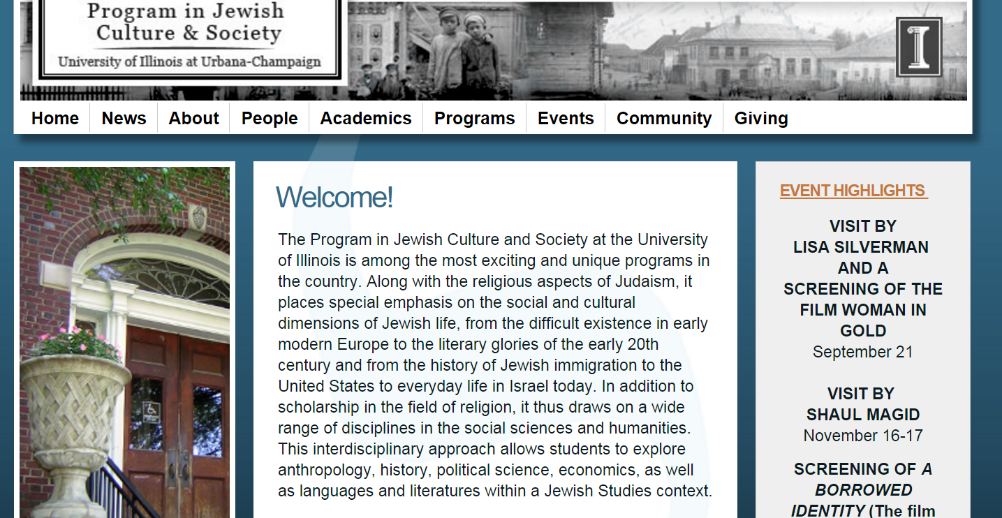
A screenshot of the University of Illinois’ Program in Jewish Culture & Society’s website’s homepage.
There are courses with content addressing the Jewish diaspora from several disciplines on campus including English, German, Hebrew, history, religious studies, social work, and Yiddish. Given all types of immigration due to conflict, displacement, immigration, voluntary and involuntary exiles, and the establishment of Israel, Jewish populations are found all over the world. These international Jewish communities and their histories of cross-cultural contact explain why Jewish Studies are rich and broad and why searching the Enterprise course catalog under all of the following headings is a good idea: ENG, GER, HEBR, HIST, RLST, SOCW, and YDSH. (Soon you will be able to search exclusively under “JS” for “Jewish Studies.”)
- Hebrew and Yiddish, too!
The below video features Dr. Sara Feldman describing her experience with developing expertise in Jewish Studies.
We are a privileged lot here at the U of I: we have the opportunity to learn two languages spoken within Jewish communities. Dr. Sara Feldman teaches both Hebrew and Yiddish on campus. She points out that while Hebrew has its origins in the Near East, Yiddish was born in Europe to groups that came to be known as Ashkenazi (see #10). The Foreign Language and Area Studies (FLAS) fellowship, available to undergraduate and graduate students, encourages the study of less commonly taught languages and has the potential to support the study of both Hebrew and Yiddish.
- Cinema, anyone?
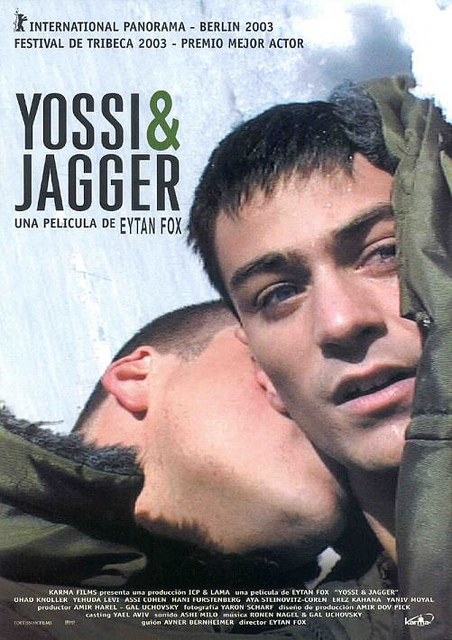
Cover art from the film Yossi & Jagger, which largely addresses LGBTQ issues. Photo Credit: José Vicente Salamero
As with most any other cultural group, a rich body of cinema has been produced that speaks to the unique experiences and struggles known to the Jewish community. For example, the Jewish Studies Program recently screened A Borrowed Identity at the Art Theater, which was followed by a question and answer session for the broader Urbana-Champaign community. This semester, Dr. Feldman and Israeli visiting scholar Dr. Vered Weiss have initiated a film series that introduces selected works, each of which will be followed by a discussion.

The exterior of the Illini Hillel Center at the University of Illinois.

The interior of the Illini Hillel Center at the University of Illinois.
Just as we have ethnic cultural houses on campus on Nevada Street, a cultural center based around Jewish identity and culture is found not far away, on John Street. It has its own library, free coffee, a terrace, and weekly cultural events including Shabbat (see #10) services and meals open to anyone in the U of I community.
- The Israel-Palestine Conflict

A map of Israel-Palestine. Credit: Wikimedia Commons
Tensions between Jewish Israelis and Palestinians have been volatile for at least six decades now. Some think that the inherent difficulties— territorial, religious, cultural, ethnic, economic, and more—are the most complex and the least resolvable of our time. To help to navigate these issues, the library has created a LibGuide on the Arab-Israeli Conflict. This resource offers answers to frequently asked questions and access to our related holdings. While on that topic, know that this A-Z Lib Guide database allows you to choose keywords to yield additional guides to help orient you in your research.
- Sayed Kashua
Below: Sayed Kashua’s series Arab Labor is reviewed by commentators on the television channel KCET.
Our campus community includes a successful Israeli-Palestinian screenwriter and author by the name of Sayed Kashua. His work, written in Hebrew, addresses the difficulties experienced by inhabitants of Israel-Palestine who pursue an ethos of tolerance but are nonetheless impacted by the violence, debates, and conflicts that have become synonymous with the region. Explore the library’s holdings credited to this artist including novels like Dancing Arabs and the television series, Arab Labor. Note: When looking for works by this author in our catalog, use this transliteration of his last name: “Qashu.” Just last week Kashua gave a reading of his new book, Native, at the Urbana Free Library.
As with many of the cultural studies programs on our campus, the Program in Jewish Culture and Society offers varying levels of involvement. Both undergraduate and graduate students can participate in the courses offered and different credentialing options are available, depending on status. Director Brett Kaplan reports that the program is actively growing the minor and is reaching out to classes, sororities and fraternities, and Hillel in order to expand its reach.
- Listserv & Social Media
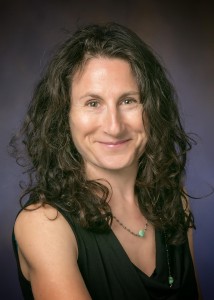
An image of the Program in Jewish Culture & Society’s Director Dr. Brett Kaplan
By e-mailing the Program in Jewish Culture and Society’s Director Brett Kaplan (bakaplan@illinois.edu), you, too, can sign up for the program’s listserv and stay abreast of various community and campus events like film screenings, community talks, and local conferences that deal with themes of the Jewish diaspora, identity, and culture. The program also has a Facebook page.
- Our Library Specialist
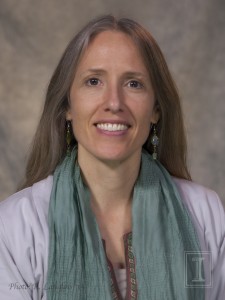
An image of Dr. Celestina Savonius-Wroth, a librarian and expert in religious studies on the University of Illinois campus.
If you are researching geography, history, politics, religion, sociology, or other topics related to Jewish society, Dr. Celestina Savonius-Wroth (cswroth@illinois.edu) of the History, Philosophy, and Newspaper Library has rigorously studied questions of Jewish identity and is available to help you shape and build your research. Also, if you prefer to do some independent exploring, check out these resources:
- A Beginner’s Vocabulary

An image of a Jewish couple’s marriage ceremony. Photo Credit: Robert Faerman
Here are some of the terms that novices and experts will encounter at any stage of study in this field:
- aliyah: (n.) one of many successive waves of immigration to Israel
- Ashkenazi: (n. and adj.) Jewish people of European descent, excluding regions like Spain, Portugal, and Greece
- Israel-Palestine: (n.) a hotly contested land in the Near East that regularly struggles with issues of sovereignty
- Mizrahi: (n. and adj.) Jewish people of Middle Eastern descent
- Sephardi: (n. and adj.) Jewish people who historically resided in the Iberian Peninsula, especially up until the 15th century, including those who were later expelled from the region
- Shabbat: (n.) Known as “(the) Sabbath” in English, this is a holy day of rest that comes at the end of the week for Jews.
- Orthodox, Haredi: (n. and adj.) These terms refer to conservative, observant Jews who attempt to respect traditional precepts of religiosity.
- Yiddish: (n.) A language used within many Jewish communities that is of Germanic origin
Bonus: Author’s Pick
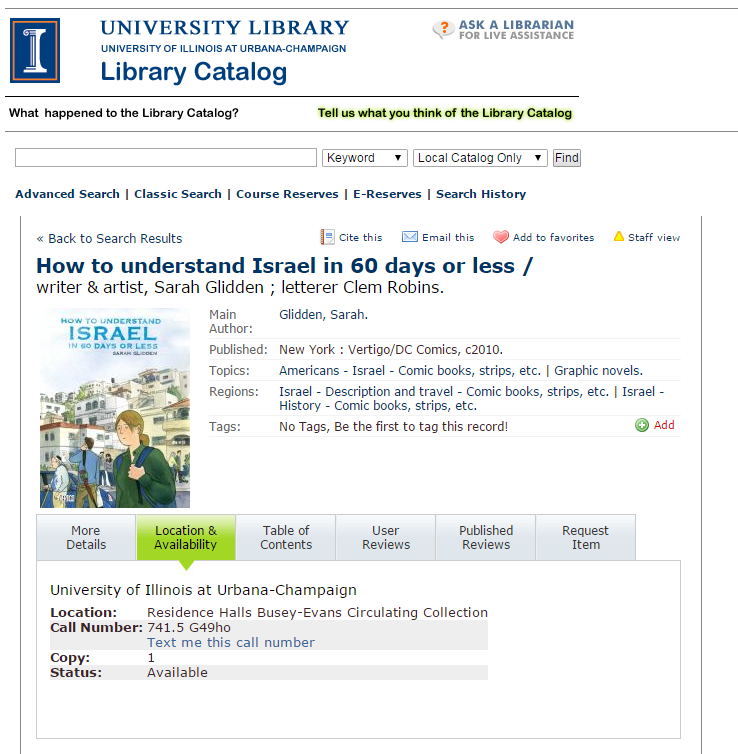
The University of Illinois’ Library’s Catalog record for Sarah Glidden’s How to Understand Israel in 60 Days or Less
Also, to begin framing your understanding of Jewish Studies, consider checking out Sarah Glidden’s How to Understand Israel in 60 Days or Less, which grapples with issues of identity and heritage and comes in graphic-novel form.
For more posts like these, be sure to like the International & Area Studies Library’s Facebook page.

